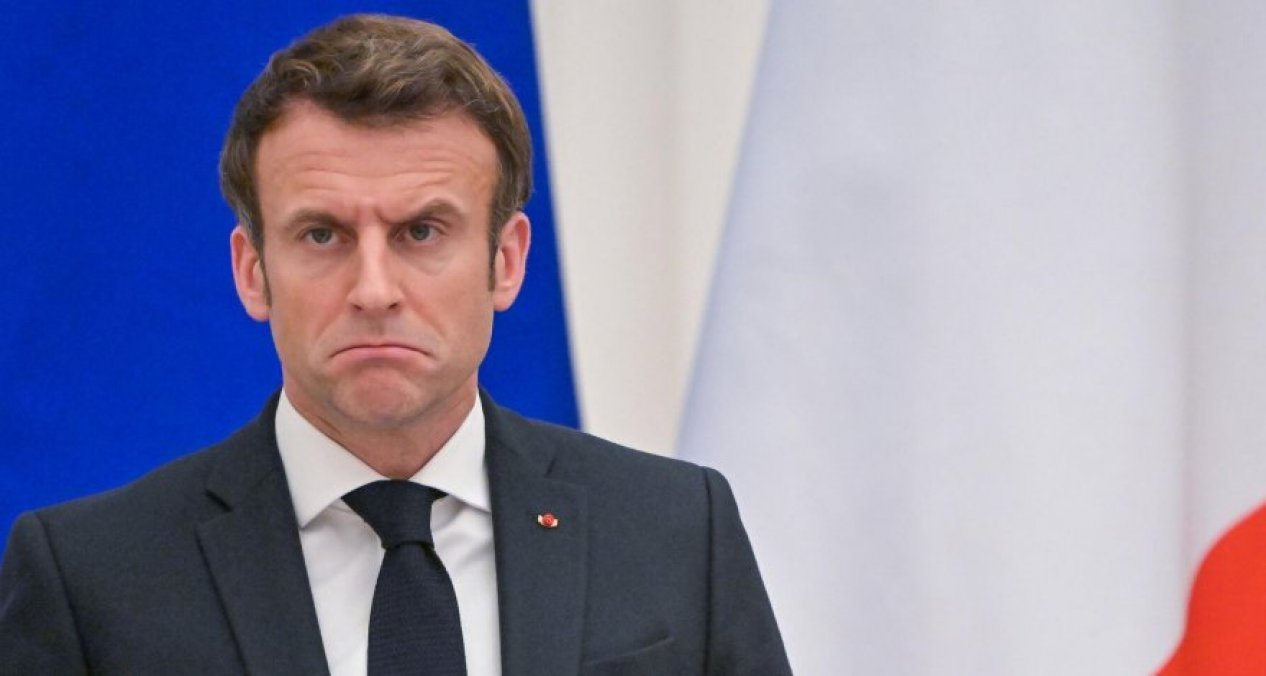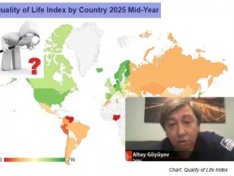
Renaissance,” organized by the Baku Initiative Group on February 24 in Istanbul, sent a letter to French President Emmanuel Macron, in which they expressed deep concern about the peoples of Polynesia, Corsica, Melanesia, the Caribbean and the Antilles who suffered from colonialism. It was also emphasized that, realizing their responsibility to history and their own peoples, representatives of the organizations of Polynesia, Corsica, Melanesia, the Caribbean and the Antilles, the last colonies of France, as well as the Baku Initiative Group, demanded that President Macron prevent the actions of the French government against international rules and practices. “At a time when the humanity is faced with the implications of global warming and unprecedented dangers that threaten the future, we ask you (President Macron – ed.) to respect the provisions of the UN Charter and the International Covenant on Civil and Political Rights,” the letter emphasizes.
Meanwhile, in Paris, farmers, dissatisfied with government policies, broke through the police cordon and burst into the pavilion of the Agricultural Exhibition, where French President Emmanuel Macron arrived. Clashes broke out between demonstrators and security personnel at the Agricultural Exhibition. Scuffles broke out between security and protesters. Protesters booed the president, shouting “Macron, resign,” and pelted security guards with eggs. The police came to their aid. Law enforcement officers began to detain the troublemakers. Nevertheless, the farmers managed to surround Macron and force him to listen to them. They listed the problems faced by the agricultural industry. These include food pricing – the Egalim law, high taxes, cheap Ukrainian grain, expensive diesel and diesel fuel. Farmers criticized Macron for inaction and inability to solve problems. Macron became angry and raised his voice, recalling his achievements in agriculture.
Faktyoxla Lab. has tried to find out why France’s domestic and foreign policy turned out to be such a failure, and why the French president was so unpopular.
First of all, this concerns the African region, where Paris is trying to retain its former influence – but French neocolonialism is collapsing literally before our eyes. Macron’s African failure may have begun with Operation Barkhane in the Sahel.
During the active French presence in Mali (since 2013), the foreign contingent was unable to defeat the radical formations. Moreover, the situation only got worse as the number of terror attacks increased every year. In the case of the Sahel countries, France’s policy was more like blackmail: Paris, taking advantage of its position, occupies areas where minerals, such as uranium or gold, are mined, supposedly in exchange for protection from terrorists. However, terrorists continue their activities. The vulnerability of this policy is that you will still have to pay for it. Macron paid with the most valuable resource a state can have: its international reputation. When he announced a sharp reduction in troops in Mali in the summer of 2021, French experts said that this was tantamount to “an admission of defeat.”
It Is not surprising that neo-colonialist policies are not welcomed in France and other countries. For example, Macron’s visit to the CAR was canceled due to the fact that the administration of President Faustin-Archange Touadera was not notified of the visit of his colleague according to the rules. So the French president was not allowed into the country where Paris once freely overthrew and installed the entire top leadership. In October 2021, Algeria recalled its ambassador from France due to Macron’s “irresponsible statements” that the country allegedly rewrote history and hatred of France.” The Algerians regarded this as interference in the internal affairs of the state. Against the backdrop of diplomatic scandals, anti-French sentiments became more frequent. Although one of Macron’s main election slogans in 2017 was to end France’s colonial legacy, in fact, his actions only speak of a new form of domination. In Africa, demonstrations regularly occur against the French military, financial and cultural presence on the continent. Protests against France also occur in Niger, Senegal, Burkina Faso, Nigeria and others. Among the most prominent opponents of French dominance in the region are the pan-Africanist movement Urgence Panafricaniste, Alternatives Espaces Citoyens, Yerewolo, Tournons la Page and many others.
Macron has more than once found himself at the center of diplomatic scandals, showing disrespect for Africans. For example, residents of the continent were outraged by the French leader’s statement that one of Africa’s “main problems” is the large number of children. He was also extremely disrespectful in Burkina Faso, speaking at the University of Ouagadougou, when he joked about the country’s electricity problems. The leader of Burkina Faso, Roch Marc Christian Kabore, left the hall, to which Macron said that he “went to fix the air conditioner.” Thus, both in word and in deed, Macron behaves in Africa as a neo-colonialist, allowing himself to insult the leadership of countries and the people of Africa and interfere in their affairs. Both the peoples and elites of African countries respond by withdrawing from France’s sphere of influence. In turn, the powerless Macron is trying to blame Türkiye for the growth of anti-French sentiment in Africa.
Perhaps the last year and a half can be considered the most disastrous for Macron. For example, according to many journalists, his African voyage in 2023 is considered a disgrace for the French president. Emmanuel Macron completed it in the Democratic Republic of the Congo. There he, apparently unable to bear the white man’s burden, began to teach life to both the Congolese themselves and their president right in front of the cameras. It all started with uncomfortable questions. About neighboring Rwanda, which Paris supports. And Rwanda, in turn, supports the rebels fighting against the DRC. This has been the case since the 90s of the last century, since the war between the Tutsis and the Hutus – Paris also intervened in that war, so much so that Africans still believe that the French did not try to stop the genocide, but supported those who carried it out. Meanwhile, big problems awaited Macron in France. A national strike has started in the country.
As many analysts note, Emmanuel Macron’s trip to the Middle East was another fiasco confirming the diplomatic degradation of France. Although the reasons run deep, the president has significantly accelerated the decline in France’s international prestige in recent years. Just over two weeks after the Hamas attack that killed 1,400 people, including 35 French, Emmanuel Macron embarked on a trip to the Middle East. He was promised, unlike other Western leaders, meetings with Benjamin Netanyahu in Jerusalem, Mahmoud Abbas in Ramallah, King Abdullah II of Jordan in Amman and President El-Sisi in Cairo. It was possible to meet only with Netanyahu, and these negotiations ended in another failure of French diplomacy. And this is due to President Macron’s unrealistic proposal to form a coalition of Western democracies and moderate Arab countries against Hamas.
The inconsistent initiative of Emmanuel Macron not only endangered the lives of the French hostages, but also contributed to the acceleration of the internationalization of the conflict and finally confirmed in the eyes of the rest of the world the existence of double standards in relation to citizens of Western countries and the rest of humanity.
That is, it was Macron who contributed to the acceleration of France’s diplomatic collapse, as evidenced by the unprecedented degradation of its image and influence. French diplomacy towards the Middle East and the Maghreb is now governed by domestic politics and fear of Muslim communities, which has reached a climax following unrest in 500 cities. Foreign policy is also devoid of any logic. Finally, the president's demand to handle everything alone, as well as his disrespect for diplomats demonstrated by reforming the diplomatic corps, legitimized amateurism and replaced the protection of the highest interests of the nation with very short-term objectives.
As for politics within France, this is, first of all, connected with the personality of the French president. He is called insensitive and arrogant. Like, Emmanuel Macron loves to pose and is distinguished by pathetic seriousness. The lack of territorial connections, the demanding language and his general style, alien to ordinary Frenchmen, distance him, for example, from Jacques Chirac for an eternity. But even Francois Hollande, who wanted to be the “people’s” president, became very unpopular towards the end of his mandate. Part of the explanation lies in the fact that Macron chose for himself a concentrated presidential style of government as an impressive symbol of omnipresence and omnipotence. Managing the Yellow Vests and Covid-19 crises has further alienated him from large parts of the people. The promises of 2017 about a great renewal and the division of power were not fulfilled.
As many journalists and political scientists have noted, looking at Macron, it may seem that he despises anyone who stands in his way. The French’s visceral revulsion toward Macron reflects deeper social divisions. Many French voters feel abandoned and Macron does not take their interests seriously. Let us remember that French President Emmanuel Macron was publicly slapped in the face. Video footage from the scene of the incident was actively disseminated on social networks and caused a great resonance in France and in the world. The scandalous incident occurred during the head of state’s trip to the Drome department in the southeast of the country. Emmanuel Macron approached a crowd of local residents and began to communicate with them. He took one of those present by the hand. At that moment, the man hit Emmanuel Macron in the face. Although the attack on Macron was condemned by the leaders of French parties, in contrast to the political spectrum, French society was not so categorical in its assessments. In general, the French have a negative impression of Macron. Not every country has citizens who despise the president so much that they allow themselves to slap the head of state.
In a word, the situation is such that the people hate their president, and officials and law enforcement officers despise him – this is the situation in which France finds itself now.




















